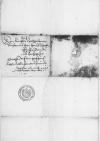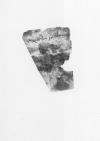Dem durchlauchten, hochgebornen fursten und hern, hern ⌊Albrechten⌋, [marggra]ffen zw ⌊Branden[burg]⌋ [u]nd herczogen zw ⌊Prewssen⌋, / unserm grosgunstigen, lieben hern und freunde
Durchlauchter, hochgeborner furst, / grosgunstigerr, lieber herr und freundt. / Mein freuntliche und willige dienst / mit wunschung der gnad und frieds des almechtigenn zuvoran. /
So dis mol der achtbar, hochgelert her doctorr ⌊Ioannes Reinek⌋, meiner ⌊svester⌋ mann, / sich tuth zu Ewer durchlaucht / begebenn, / hab ich in nicht ane dis meinn schreibenn an Ewer Durchlaucht mocht vonn mir lossenn, / der so lange hie neben mir, Ewer Durchlaucht schreiben wartende, / vorczogenn. / Und ist mir uff etlich brive, / ouch im, / wie es Ewer Durchlaucht mit im vorlossenn, / kein antwurt oder bescheidt zu komenn. / Bitt derhalbennn, wold sein ausbleibenn nicht in ungenadenn uffnemenn, / dan wir haben samptlich bisher uff Ewer Durchlaucht schreiben gewartet. / Ich nemlich, / das ich heth mocht wissenn Ewer Durchlaucht entlich gemuet demm hern ⌊bischoff zu Krako⌋ von wegen der greniczen mit ⌊Littenn⌋ / zu schreibennn, / und bin noch des erbuttig, / so Ewer Durchlaucht uff den negsten sanct Andrae tag gen ⌊Peterkau⌋ was schreiben / oder durch mein schreibenn entpittenn wil, / das ich solchs mit eigenemm boten disse tage wil fertigenn etc. / Ouch hab ich dem hern ⌊doctor⌋ ein beth zu thun an Ewer Durchlaucht, was ⌊Hansen Sergiten⌋ belangt, / befholenn. / Bit, Ewer Durchlaucht wold in gnediglich horenn / und unser bitt gunstige stadt gebenn. / Beschulde ich fruntlich und dinstlich alzeit gernn. / Newe zceitunge, die disse tage an mich gelanget, / wirt der her ⌊doctor⌋, / den ich in Ewer Durchlaucht gnad und mich in der selben gunst befhele, / anzcegennn / und, so Ewer Durchlaucht in gutter gesuntheit, / mit der sachen etc. ausrichtung noch willenn / wider ist kommen, sol mir ein herczlicge freudt sein. / Got der almechtige gebe Ewer Durchlaucht seel unnd leibs heil unnd langwerige wolfart. /


